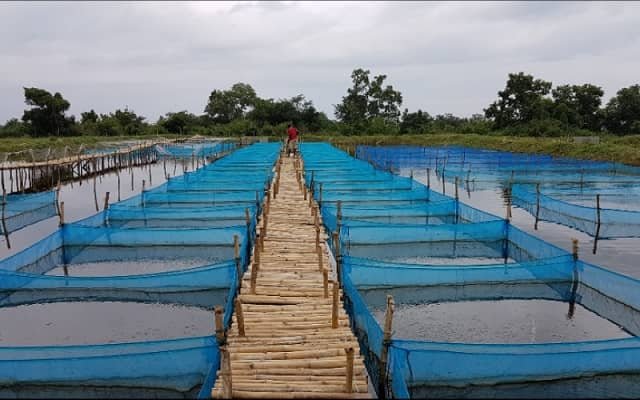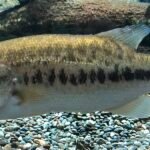The NOAA Aquaculture Strategic Plan will guide our efforts to enhance the growth of sustainable U.S. aquaculture.

Today, NOAA published its first-ever 5-Year Strategic Plan for Aquaculture to guide the agency’s work from 2023-2028. The Strategic Plan was developed by the NOAA Aquaculture Program, which includes the NOAA Fisheries Office of Aquaculture, the Office of Oceanic and Atmospheric Research’s National Sea Grant Program, and the National Ocean Service’s National Centers for Coastal Ocean Science.
“Through this plan, NOAA will support a thriving, resilient, and inclusive U.S. aquaculture industry as part of a competitive domestic seafood sector,” said NOAA Fisheries Assistant Administrator Janet Coit. “This plan will act as a framework to guide NOAA’s Aquaculture Program, set priorities to achieve our mission, and support NOAA’s vision of healthy and resilient ecosystems, communities, and economies.”
The Strategic Plan articulates a vision for an industry that supports jobs, expands access to nutritious domestic seafood, and reinforces healthy coastal and ocean ecosystems in a changing environment. This is supported by the Program’s mission of providing science, services, and policies that create conditions for opportunity and growth of sustainable U.S. aquaculture.
Four Goals to Expand Sustainable Aquaculture
The Strategic Plan is designed to support collaboration and align goals and objectives across the NOAA Aquaculture Program and with our partners. It includes the following components:
- Vision and Mission to guide our work
- Core Values to illustrate who we are and our philosophy as a program
- Four key goals, which outline our top priorities over the next five years
Goal 1. Manage Sustainably and Efficiently
Improve the regulatory processes for sustainable coastal and marine aquaculture through collaboration with partners.
Goal 2. Lead Science for Sustainability
Use world-class science expertise to meet management and industry needs for a thriving seafood production sector and share this knowledge broadly.
Stay Always Informed
Join our communities to instantly receive the most important news, reports, and analysis from the aquaculture industry.
Goal 3. Educate and Exchange Information
Build awareness and support for coastal, marine, and Great Lakes aquaculture through two-way communication with diverse stakeholders and partners.
Goal 4. Support Economic Growth and Viability
Facilitate a robust aquaculture industry that thrives as a key component of a resilient seafood sector.
“Sustainable aquaculture encompasses the “triple bottom line” of economic viability, environmental stewardship, and social responsibility,” said David O’Brien, Acting Director of the Office of Aquaculture. “As the demand for seafood continues to increase, and climate change continues to pose a threat to food security, NOAA will continue supporting efforts to grow seafood on land, in coastal waters, and the open ocean in harmony with a healthy and resilient environment.”
NOAA’s Aquaculture Program
The Strategic Plan was developed collaboratively by the NOAA Aquaculture Program and the public. Input was sought through public listening sessions, and feedback was incorporated to ensure the plan reflects the needs of a diverse range of users and stakeholders. This is the first Strategic Plan developed by all three Line Offices in the NOAA Aquaculture Program, highlighting the strong shared goal to support resilient U.S. aquaculture.
The NOAA Aquaculture Program consists of:
National Centers for Coastal Ocean Science Aquaculture
“Our aquaculture team strives to advance sustainable aquaculture development in the United States through science, service, and stewardship. We will seek to provide ongoing opportunities for public input to ensure results that are community-driven,” said O’Brien.
Editor at the digital magazine AquaHoy. He holds a degree in Aquaculture Biology from the National University of Santa (UNS) and a Master’s degree in Science and Innovation Management from the Polytechnic University of Valencia, with postgraduate diplomas in Business Innovation and Innovation Management. He possesses extensive experience in the aquaculture and fisheries sector, having led the Fisheries Innovation Unit of the National Program for Innovation in Fisheries and Aquaculture (PNIPA). He has served as a senior consultant in technology watch, an innovation project formulator and advisor, and a lecturer at UNS. He is a member of the Peruvian College of Biologists and was recognized by the World Aquaculture Society (WAS) in 2016 for his contribution to aquaculture.







